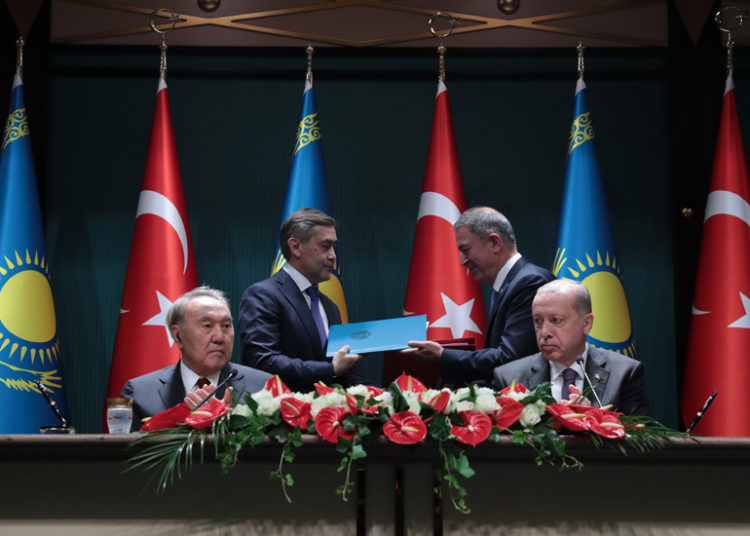Nordic Monitor
Turkey and Kazakhstan have entered into a military cooperation agreement that includes the defense industry, military intelligence sharing, joint exercises, information systems and cyber defense. The two sides will also cooperate in peacekeeping operations and military training as well as military scientific and technical research.
According to the text of the agreement, obtained by Nordic Monitor, Turkey and Kazakhstan pledge to cooperate in the defense industry; military intelligence sharing; participation in joint exercises and training; logistics cooperation, grant and logistics support; communications, electronics, information systems and cyber defense; peacekeeping and humanitarian aid operations; and information and experience sharing on nuclear, radiation, biological and chemical protection.
The two countries have also committed themselves to focusing on military training and education, military medical and health services, military law systems, mapping, hydrography, topography and navigation, exchange of military personnel and units, information and experience sharing on military and technological research, and carrying out training programs on mines and improvised explosive devices.
The 28-article agreement was submitted to the Turkish parliament for approval by President Recep Tayyip Erdoğan on April 6, 2020. The Kazakh government approved the accord in December 2019.
The letter submitted to parliament seeking approval of the military cooperation deal with Kazakhstan:
Then-Kazakh President Nursultan Nazarbayev paid an official visit to Turkey to attend the third meeting of the Turkey-Kazakhstan High Level Cooperation Council, held in Ankara on September 13, 2018. Following the meeting, Turkish Defense Minister Hulusi Akar and his Kazakh counterpart, Nurlan Yermekbayev, signed the military cooperation agreement, which creates a legal framework for bilateral defense cooperation.
The “New Synergy Joint Economic Program 2018-2020 Action Plan” was also signed by the foreign ministers of the two countries the same day.
The deal sets forth forms of cooperation such as “providing mutual logistical support and exchanging munitions, materials and services in the form of grants or in return for payment”; organizing joint discussions, consultations and meeting; and carrying out joint military exercises. Turkey and Kazakhstan will provide annual implementation plans for joint activities.
Furthermore, the deal specifies conditions for the handling of classified information generated under the agreement, detailing how it will be transmitted and shared with third parties. According to the deal, the exchange and protection of classified information and material will be carried out in a separate agreement.
The terms of the agreement will be executed by the General Staff on the Turkish side and the Ministry of Defense for Kazakhstan.

Kazakhstan is a regional market for Turkish defense companies. Last month, Kazakhstan signed a deal with state-owned Turkish defense contractor Aselsan to purchase remotely controlled weapon systems (SARP). According to the agreement, Aselsan will deliver to Kazakhstan its SARP advanced remote controlled stabilized weapon station (RCWS) in the ‘‘SARP-DUAL’’ configuration later this year. SARP-DUAL is an extension of Aselsan’s existing SARP system.
Aselsan, a subsidiary of the Turkish Armed Forces Foundation (TAFF), develops and manufactures software, equipment, systems and platforms for the army, navy, air force and aerospace industries. The defense industry supplier opened a $44 million plant in Kazakhstan in 2013.
Moreover, Turkish aerospace company Roketsan, another TAFF subsidiary, is also working with its Kazakh partners to develop joint projects.
The full text of the military cooperation agreement is posted below:
TAFF was founded in 1987 to “enhance the combat strength of the Turkish Armed Forces” and has played a leading role in the establishment and development of the defense industry. It directly and indirectly controls major companies such as Aselsan (electronics), Isbir (generators and alternators), Aspilsan (battery pack products), Havelsan (informatics), Roketsan (rockets and missiles) and Tai (aerospace and satellites). In 2018 it earned 43 percent of the Turkish defense industry’s total revenue, while it was responsible for 41 percent of defense exports.
On December 24, 2017 President Erdoğan issued a decree placing the military ruled “foundation” under his control. Today, the TAFF board of trustees, as the main decision-making organ of the foundation, is chaired by Erdoğan.












